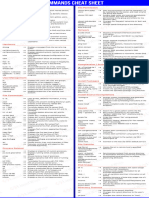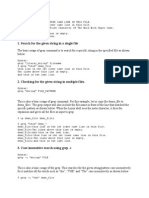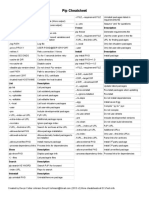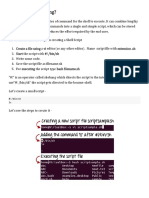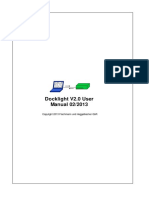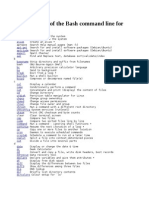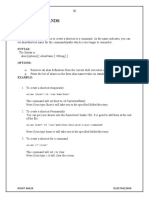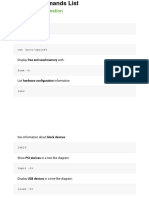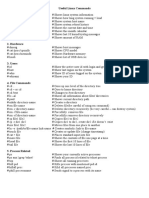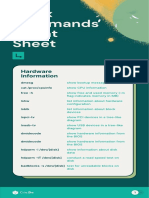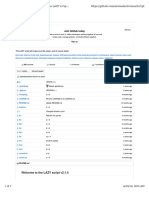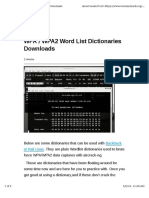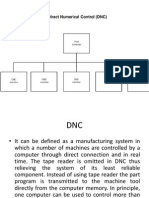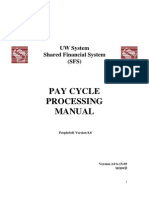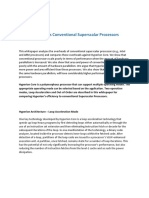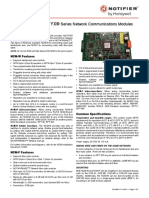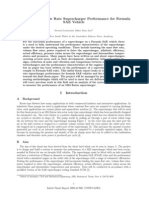LINUX COMMANDS CHEAT SHEET
System File Permission
uname => Displays Linux system information chmod octal filename => Change file permissions of the file to octal
uname -r => Displays kernel release information Example
uptime => Displays how long the system has been running including
chmod 777 /data/test.c => Set rwx permissions to owner, group and everyone (every-
load average
one else who has access to the server)
hostname => Shows the system hostname
chmod 755 /data/test.c => Set rwx to the owner and r_x to group and everyone
hostname -i => Displays the IP address of the system chmod 766 /data/test.c => Sets rwx for owner, rw for group and everyone
last reboot => Shows system reboot history chown owner user-file => Change ownership of the file
date => Displays current system date and time chown owner-user: owner-group => Change owner and group owner of the file
timedatectl => Query and change the System clock file_name
chown owner-user:owner-group- => Change owner and group owner of the directory
cal => Displays the current calendar month and day
directory
w => Displays currently logged in users in the system
whoami => Displays who you are logged in as
Network
finger username => Displays information about the user
ip addr show => Displays IP addresses and all the network interfaces
Hardware ip address add => Assigns IP address 192.168.0.1 to interface eth0
192.168.0.1/24 dev
eth0
dmesg => Displays bootup messages
ifconfig => Displays IP addresses of all network interfaces
cat /proc/cpuinfo => Displays more information about CPU e.g model, model
name, cores, vendor id ping host => ping command sends an ICMP echo request to establish a
connection to server / PC
cat /proc/meminfo => Displays more information about hardware memory e.g.
Total and Free memory whois domain => Retrieves more information about a domain name
lshw => Displays information about system’s hardware configuration dig domain => Retrieves DNS information about the domain
lsblk => Displays block devices related information dig -x host => Performs reverse lookup on a domain
free -m => Displays free and used memory in the system (-m flag host google.com => Performs an IP lookup for the domain name
indicates memory in MB)
hostname -i => Displays local IP address
lspci -tv => Displays PCI devices in a tree-like diagram
wget file_name => Downloads a file from an online source
lsusb -tv => Displays USB devices in a tree-like diagram
netstat -pnltu => Displays all active listening ports
dmidecode => Displays hardware information from the BIOS
hdparm -i /dev/xda => Displays information about disk data Compression / Archives
hdparm -tT /dev/xda => Conducts a read speed test on device xda
badblocks -s /dev/xda => Tests for unreadable blocks on disk tar -cf home.tar home => Creates archive file called ‘home.tar’ from file ‘home’
tar -xf files.tar => Extract archive file ‘files.tar’
Users tar -zcvf home.tar.gz => Creates gzipped tar archive file from source folder
source-folder
id => Displays the details of the active user e.g. uid, gid, and gzip file => Compression a file with .gz extension
groups
last => Shows the last logins in the system
Install Packages
who => Shows who is logged in to the system
groupadd “admin” => Adds the group ‘admin’
rpm -i pkg_name.rpm => Install an rpm package
adduser “Sam” => Adds user Sam
rpm -e pkg_name => Removes an rpm package
userdel “Sam” => Deletes user Sam
dnf install pkg_name => Install package using dnf utility
usermod => Used for changing / modifying user information
Install Source (Compilation)
File Commands
./configure
ls -al => Lists files - both regular & hidden files and their permis-
sions as well. make
pwd => Displays the current directory file path
make install
mkdir ‘directory_name’ => Creates a new directory
rm file_name => Removes a file Search
rm -f filename => Forcefully removes a file
rm -r directory_name => Removes a directory recursively
grep ‘pattern’ files => Search for a given pattern in files
rm -rf directory_name => Removes a directory forcefully and recursively
grep -r pattern dir => Search recursively for a pattern in a given directory
cp file1 file2 => Copies the contents of file1 to file2
locate file => Find all instances of the file
cp -r dir1 dir2 => Recursively Copies dir1 to dir2. dir2 is created if it does not
find /home/ -name => Find file names that begin with ‘index’ in /home folder
exist
“index”
mv file1 file2 => Renames file1 to file2
find /home -size => Find files greater than 10000k in the home folder
ln -s /path/to/file_name => Creates a symbolic link to file_name +10000k
link_name
touch file_name => Creates a new file
Login
cat > file_name => Places standard input into a file
more file_name => Outputs the contents of a file ssh user@host => Securely connect to host as user
head file_name => Displays the first 10 lines of a file ssh -p port_number => Securely connect to host using a specified port
tail file_name => Displays the last 10 lines of a file user@host
gpg -c file_name => Encrypts a file ssh host => Securely connect to the system via SSH default port 22
gpg file_name.gpg => Decrypts a file telnet host => Connect to host via telnet default port 23
wc => Prints the number of bytes, words and lines in a file
xargs => Executes commands from standard input File Transfer
scp file1.txt server2/tmp => Securely copy file1.txt to server2 in /tmp directory
Process Related
rsync -a /home/apps / => Synchronize contents in /home/apps directory with /backup
backup/ directory
ps => Display currently active processes
ps aux | grep ‘telnet’ => Searches for the id of the process ‘telnet’ Disk Usage
pmap => Displays memory map of processes
top => Displays all running processes df -h => Displays free space on mounted systems
df -i => Displays free inodes on filesystems
kill pid => Terminates process with a given pid
fdisk -l => Shows disk partitions, sizes, and types
killall proc => Kills / Terminates all processes named proc
du -sh => Displays disk usage in the current directory in a hu-
pkill process-name => Sends a signal to a process with its name man-readable format
bg => Resumes suspended jobs in the background findmnt => Displays target mount point for all filesystems
fg => Brings suspended jobs to the foreground mount device-path => Mount a device
mount-point
fg n => Brings job n to the foreground
lsof => Lists files that are open by processes Directory Traverse
renice 19 PID => Makes a process run with very low priority
cd .. => Move up one level in the directory tree structure
pgrep firefox => Find Firefox process ID
cd => Change directory to $HOME directory
pstree => Visualizing processes in tree model
cd /test => Change directory to /test directory
